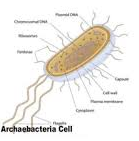Science > Biology > Classification of Microbes, Protists, and Fungi > Kingdom Monera The kingdom Monera is also referred as kingdom prokaryotae. Bacteria are the sole members of the Kingdom Monera. Organisms of kingdom monera are called lower-level organisms because no tissue-level organization is present in them. Their one cell is capable of performing all the functions […]
Categories
Kingdom Monera
- Post author By Hemant More
- Post date March 8, 2020
- 2 Comments on Kingdom Monera
- Tags Actinomyces, Biology, Budding bacteria, Chaemoautotrophs, Chlamydias, Classification of organisms, Cyanobacteria, Enterobacteria, Gliding bacteria, Gram Straining Technique, Halophiles, Kingdom Monera, Methanogens, Pseudomonas, Rickettsias, Spirochaetes, Sub Kingdom Archaebacteria, Subkingdom Eubacteria, Thermoacidophiles



